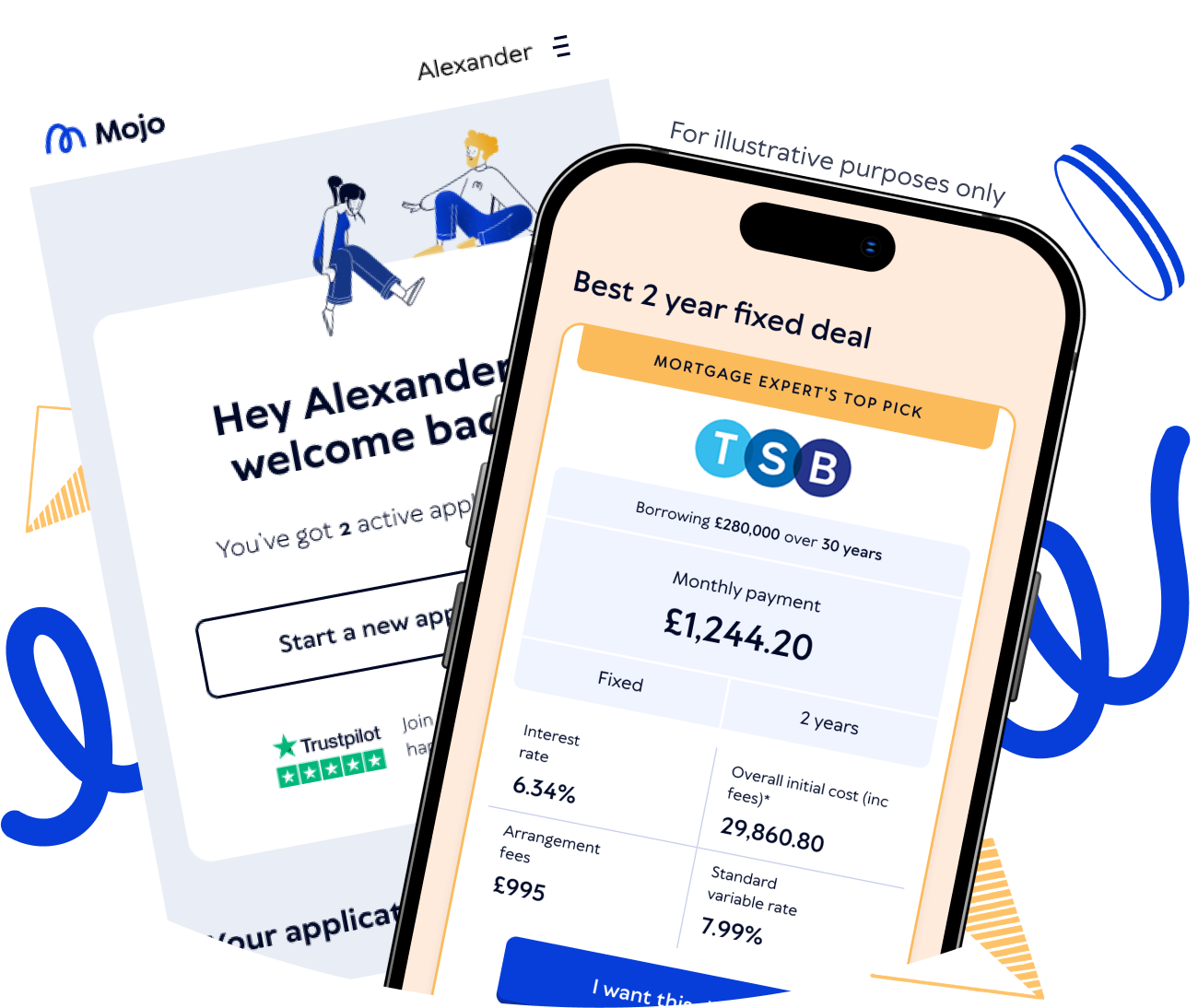Mortgage application red flags to look out for
To make your dream home a reality, you'll first need to get your mortgage application sorted. We’re sharing the red flags lenders may look out for on your bank statement and how to get your application into tip-top shape ready to impress your lender.


12 surprising bank statement red flags that could cost you a mortgage offer
1. Patchy payments
Fluctuating deposits into your bank account rather than a consistent monthly salary payment can be a sign of instability. It could suggest you might struggle to keep up with your mortgage payments each and every month. While there are often perfectly valid reasons for having different amounts coming in each month, your lender might want to see extra documentation to help them assess your affordability.
2. Skipped bills
A history of missed or late payments on bills, credit cards or other loans (identified as returned direct debits on your bank account) can be a sign of financial difficulty. This will be visible on both your bank statements and your credit report and can significantly impact your chances of being approved for a mortgage. Make sure you always keep up with any existing repayments.
3. A lot of debt
Large or multiple debt payments (such as personal loans) might indicate high debt-to-income ratio, which could mean it’d be a squeeze to add mortgage payments to your financial commitments each month. It’s advisable not to apply for new lines of credit or loans before trying to get a mortgage, as this could impact how much you’re able to borrow.
4. Risky spending habits
A lottery ticket purchase here and there is unlikely to raise any eyebrows. But frequent and large transactions to betting shops or gambling sites can be a major red flag. It suggests risky spending habits, which may raise concerns on whether you'll prioritise mortgage repayments.
5. Creative payment references
It’s tempting to put down silly payment references when transferring money to friends and family. But be careful this doesn’t teeter into inappropriate territory as lenders are unlikely to see the funny side. At best, it’ll cause delays as they’ll want an explanation. At worst, it could lead to rejection. Avoid delays (and embarrassment) by using genuine references that reflect what the transfer was actually for.
6. Concerns about cash
Frequent and large cash withdrawals - or indeed unexplained, large sudden cash deposits - can make lenders nervous as it can raise suspicion of fraudulent activity. It can also be a particular concern for self-employed applicants, as it might suggest undeclared income.
7. Unexplained large deposits
Any large deposits, particularly those linked to an unknown source or ones that seem unusual compared to your normal transactions, are likely to be questioned. Perhaps you’ve come into some inheritance, been gifted money or had a bonus from work - these are all legitimate reasons to explain to the lender, but you may need to provide proof of the source of these funds.
8. Spending secrets
Forgetting to mention a monthly subscription, a small loan or a credit card you barely use in your application might not seem like a big deal, but any undisclosed info will understandably make lenders wary as it could suggest you’ve been dishonest in other areas of your application too. It’s always best to be upfront about your income, regular spending and any existing debts.
9. Payday mayday
Payday loans can indicate you find it tricky to manage your money. Even heavy reliance on Buy Now, Pay Later schemes can cause issues, as relying on short-term credit could suggest you’re living beyond your means.
10. Job hopper problems
Lenders will want to see a consistent level of income over a period of time, so frequent job changes and fluctuating earnings can be a concern. Be prepared to provide more documentation to prove you’re bringing in a stable, consistent income each month - particularly if you’re self-employed.
11. Overdraft overuse
Regularly dipping into your overdraft, especially if you’re exceeding your limit, can be a sign that you're living beyond your means. It suggests you don't have enough of a financial buffer, which could be a problem if interest rates rise or your circumstances change.
12. Suspicious splurging
You may be spending more than normal in the run-up to apply for a mortgage (which is understandable if you’re excitedly buying things for your new home). But this could impact how a lender views your affordability. Make sure you keep some cash in your bank account as a financial buffer, and try not to overspend in the months leading up to your application.
By being mindful of these red flags, you’ll be able to paint a clear and responsible picture of your finances. This’ll help give lenders more confidence in your money management - and could boost your chances of being accepted for a mortgage.

Work with a mortgage broker
Having a mortgage broker on hand can help you get your application in good shape. We’ll help to prepare and submit it on your behalf, to make sure all information is accurate and up-to-date and that your documentation is prepared and submitted according to lender guidelines.
How are bank statements assessed by lenders?
Bank statements are used by lenders to help them get a feel for your current financial circumstances, and how you typically spend your money. They’ll use this, alongside other elements of your application, to decide whether you may be able to afford a mortgage.
Before we dive into our list of ‘bank statement don’ts’, let’s explore why lenders scrutinise your bank statements when they assess your application:
-
Verify your income. Does the salary you stated on your application match what’s coming into your account every month? Lenders want to make sure you have a regular stream of income coming in.
-
Assess your outgoings. Where’s your money going every month, and are you a savvy spender? Mortgage providers will look at bills, subscriptions, other debt repayments and your other expenses to build a picture of your spending habits.
-
Work out your debt-to-income ratio. What percentage of your monthly income goes towards debt repayments? This helps lenders check if you can realistically handle a mortgage payment alongside your other commitments.
-
Check your deposit funds. You’ll need to provide proof of your deposit source, so your lender can check your deposit has been legitimately saved, earned or gifted.
-
Spot any causes for concern. Lenders will be on the lookout for any signs of financial instability, risky financial behaviour or fraudulent activity that could make them think twice about lending money to you.
Lenders typically ask to see three to six months’ worth of bank statements (usually for your main current account, though some may also want to look at statements for your savings account). If you’re self-employed, your lender may ask to see up to three years’ worth of statements - both from your personal bank account and your business bank account if you have one.
It’s also worth noting that, while many lenders still require physical bank statements, a growing number use secure Open Banking technology to automatically verify your income and expenditure directly from your bank, which can save you time and speed up the process.

“Lenders aren’t just being nosy. They need to make sure you’re a responsible borrower who can comfortably afford mortgage repayments alongside all your other monthly commitments. Think of your bank statement as a financial CV - you want to make sure it represents you accurately, and showcases your finances in a good light.”
April Aldridge, Director of Customer
Looking beyond your bank statement
It’s well worth flagging that lenders look at lots of different factors when making a decision on your application - not just your bank statement. They’ll also consider:
-
Your personal information. Lenders will want to make sure the details on your application match up with your documentation - so double check for mistakes or typos.
-
Your financial circumstances. Lenders will use your income and outgoings to build a picture of your financial situation to make sure you can afford a mortgage.
-
Stability. Lenders like to see consistency, so a long stay at your current address, or current job, can be a green flag.
-
Your deposit. This will impact how much you’ll need to borrow from the lender to buy the property you want - you’ll usually need a minimum deposit of 5%-10% of the property value. You’ll also need to be able to prove where the money for your deposit came from.
-
Your credit history. Lenders want to make sure you’re a reliable borrower who repays what they owe on time.
-
Whether you’re registered to vote on the electoral register. This helps a lender confirm your identity.
-
Whether you match their criteria. Every lender’s different, so it’s important to make sure you match a specific lender’s requirements before applying with them.
-
How long you’ve lived in the UK. Some lenders have restrictions on how long applicants have been residing in the UK before they can apply, and you may need to provide additional information.
-
The property you want to buy. Some lenders won’t consider lending on certain property types, so it’s always worth double checking.
FAQs
Most lenders will require bank statements from the last three to six months. However, for self-employed applicants, this period can sometimes be longer, and they will also need to see your business bank statements.
Lenders are most concerned about recent and recurring patterns of behaviour. An isolated incident from several months ago is less concerning than consistent red flags in the most recent three months. The best approach is to ensure your bank statements present a positive view of your spending habits and money management in the six months leading up to your application.
While underwriters are thorough, they’re probably not that interested in your weekly grocery shop. They’ll be looking out for your declared salary being paid in, regular outgoings, undisclosed credit commitments or any large or unusual transactions.
Not necessarily. Occasional and responsible use of a planned overdraft is unlikely to be a major issue. However, if you are constantly living in your overdraft or going over your limit, lenders will see this as a sign of financial strain and this could influence their decision on your application.
A gifted deposit is a great way for parents to help their children get on the property ladder. However, lenders need to ensure this is a genuine gift and not a loan that has to be repaid.
You will need to provide a "gifted deposit letter" signed by the person giving you the money, stating who they are and what they’re gifting you, and that they have no legal claim on the property and will not ask for the money back.
Yes, they do. Subscriptions are considered regular financial commitments and will be factored into your affordability assessment. While they aren't red flags, they do contribute to your total monthly outgoings, which can affect the amount you're able to borrow. That’s why you’ll often hear recommendations to cut back on subscriptions you rarely use, as it’s so easy to forget you’re paying them monthly.
No - this can actually look a little strange to a lender. They want to see a realistic picture of your spending habits to be confident you can manage your finances. Unusually low spending might suggest you're making a short-term effort that isn't sustainable. It’s much better to show sensible, reliable money management.